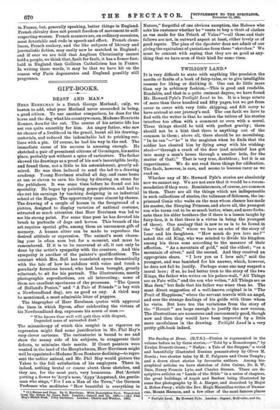GIFT-BOOKS.
BEAST AND MAN.*
HERR EERELMAN is a Dutch George Morland ; only, we hasten to add, what poor Morland never succeeded in being, a good citizen. To use another comparison, he does for the horse and the dog what his countrywoman, Madame Henriette Ronner, does for the cat. The course of his artistic life has not run quite smoothly for him. An angry father, who saw no chance of a livelihood in the pencil, burnt all his drawing. materials, and reduced the indomitable lad to pricking out- lines with a pin. Of course, he had his way in the end. The immediate cause of his success is amusing enough. He sketched a pair of prominent citizens of Groningen, his native place, probably not without a spice of caricature. The father showed the drawings as a proof of his son's incorrigible levity, and found them, not a little to his astonishment, greatly ad- mired. He was then induced to send the lad to a drawing academy. Young Eerelman studied all day, and came home at ten or eleven to earn his living by drawing on stone for the publishers. It was some time before he found out his speciality. He began by painting genre-pictures, and had to eke out his earnings by teaching designing in an industrial school at the Hague. The opportunity came almost by chance. The drawing of a couple of horses in the foreground of a picture, designed to display varieties of national costume, attracted so much attention that Herr Eerelman was led to see his strong point. For some time past he has devoted his brush to portraits of dogs and horses. This branch of the art requires special gifts, among them an uncommon gift of memory. A human sitter can be made to reproduce the desired attitude or expression. The animal's most charm- ing pose is often seen but for a moment, and must be remembered. If it is to be recovered at all, it can only be done by the artist's sympathy with the creature. And this sympathy is another of the painter's qualifications. The account which Mrs. Bell has translated opens dramatically with the tale of how he subdues with voice and touch a peculiarly ferocious hound, who had been brought, greatly reluctant, to sit for his portrait. The illustrations, mostly photographic reproductions, are all interesting ; some of them are excellent specimens of the processes. "The Queen of Holland's Ponies," and "A Pair of Friends" (a boy with a Newfoundland dog), are as good as any. A third may be mentioned, a most admirable litter of puppies.
The biographer of Herr Eerelman quotes with approval the lines in which Byron, after celebrating the virtues of his Newfoundland dog, expresses his scorn of man :— " Who knows thee well will quit thee with disgust. Degraded mass of animated dust."
The misanthropy of which this couplet is so vigorous an expression might find some justification in Mr. Phil May's very clever cartoons. The caricaturist is bound to see and show the seamy side of his subjects, to exaggerate their defects, to minimise their merits. If Court painters were wanted in the land of the Houyhnhnms, Herr Eerelman might well be appointed—Madame Rosa Bonlieur declining—to repre- sent the nobler animal, and Mr. Phil May would picture the Yahoo to the full satisfaction of his employers. There is, indeed, nothing brutal or coarse about these sketches, and they are, for the most part, very humorous. But 'Arriett putting a flower to 'Arry's nose, 'Appy 'Ampstead, the gentle- man who sings, "For I am a Man of the Town," the German Professor who meditates "How beautiful is everything in
• (14 Horses and Dogs. By 0. Earelman. With Descriptive Text. Translated from the Dutois by Clara Bell. London: Cassell and Co. 1895.—(2.) PhiL May's Sketch-Book. Fifty Cartoons. London: Chatto and Windus. 1995.
Nature," forgetful of one obvious exception, the Hebrew who asks his customer whether he "vents to buy a thuit of clothes as vas made for the Printh of Vales ?"—all these and their fellows are not, in outward aspect at least, either lovely or of good repute. The plan of the Spectator does not admit of our giving the equivalent of quotations from these "sketches." We must be content with saying that they are as good as any- thing that we have seen of their kind for some time.


















































 Previous page
Previous page